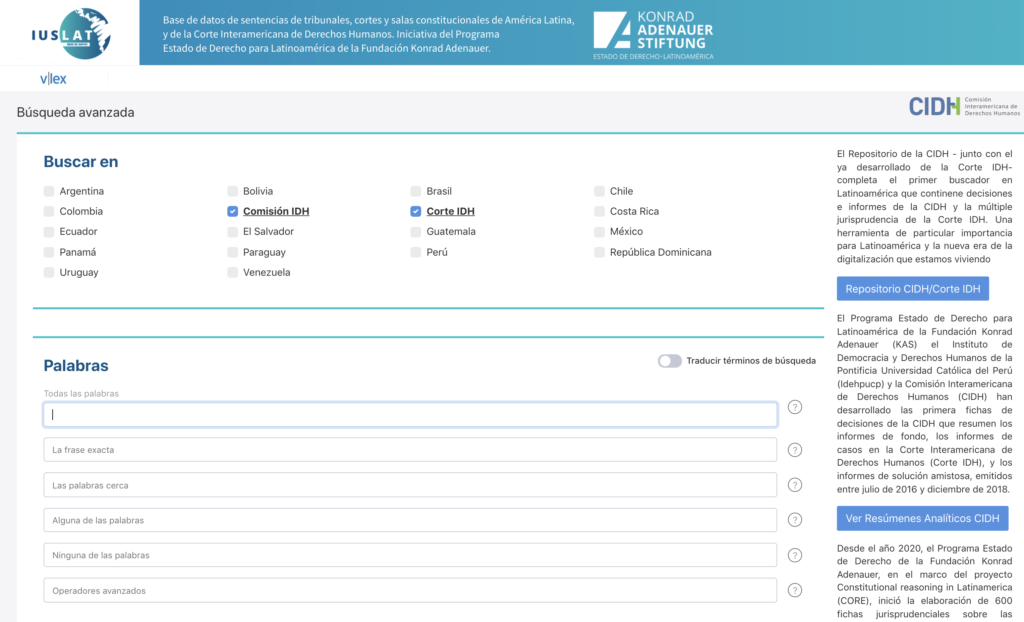 Last month, the Inter-American Commission on Human Rights (IACHR) formally announced the availability of a new online database of its decisions and other documents. [IACHR Press Release: Repository] The database, hosted by the Konrad Adenauer Stiftung (KAS), is the first such tool created with the IACHR’s involvement. The new site adds to a list of recent efforts by the IACHR to increase access to the regional oversight body and its outputs, which include the establishment of a User Support Section, a growing collection of summaries of merits reports and friendly settlement reports, a factsheet on petitions “under study,” and a digest of IACHR decisions on admissibility criteria. It also joins relevant tools created by other institutions, including the WorldCourts repository of international case law and the SUMMA database on cases submitted to the IACHR’s counterpart Inter-American Court of Human Rights. These and other tools are detailed in IJRC’s updated Guide to Researching International Human Rights Law.
Last month, the Inter-American Commission on Human Rights (IACHR) formally announced the availability of a new online database of its decisions and other documents. [IACHR Press Release: Repository] The database, hosted by the Konrad Adenauer Stiftung (KAS), is the first such tool created with the IACHR’s involvement. The new site adds to a list of recent efforts by the IACHR to increase access to the regional oversight body and its outputs, which include the establishment of a User Support Section, a growing collection of summaries of merits reports and friendly settlement reports, a factsheet on petitions “under study,” and a digest of IACHR decisions on admissibility criteria. It also joins relevant tools created by other institutions, including the WorldCourts repository of international case law and the SUMMA database on cases submitted to the IACHR’s counterpart Inter-American Court of Human Rights. These and other tools are detailed in IJRC’s updated Guide to Researching International Human Rights Law.
IUSLAT Database
The new database is housed in the IUSLAT platform maintained by the KAS Rule of Law Program for Latin America. While the IACHR links to the platform from its website (notably, not on the Cases webpages, but from its homepage), the tool is not integrated into the IACHR website. Documents are presented as embedded, searchable PDFs and can be downloaded.
The IUSLAT site is only available in Spanish. However, users may use the site’s translate function to translate their search terms from English to Spanish. To do this, click the “Traducir términos de búsqueda” toggle and choose “Español” as the language, then enter your English search term(s) into following field. Thereafter, users could use the results in IUSLAT to find the relevant documents on the IACHR website, using the document title, type, and year. Note that “Petición” in the title indicates that the document is an admissibility report, while “Caso” in the title means it is a merits report.
According to the IACHR announcement, the database includes IACHR reports on the admissibility, merits, and friendly settlement of petitions; thematic and country reports; and decisions on precautionary measures. The site does not provide a clear explanation of what it does, or will, contain. For example, there is no statement regarding how up-to-date the site content currently is. A search for IACHR documents currently returns 3,838 results, dating from January 1979 to September 2021.
Filters allow users to limit their searches to specific types of decisions, perform full-text searches, and indicate the relevant dates. However, these filters do not always appear; for example, it is not possible to filter by decision type when searching the documents of both the IACHR and IACtHR, and relevant filters did not always appear on the search page. (Compare this view to this view, for example.) Similarly, there appear to be some lapses; a search using the filters for IACtHR judgments produces no results.
The IUSLAT platform also provides access to select case summaries of IACHR merits reports and friendly settlement reports, drafted by the Institute of Democracy and Human Rights at the Pontifical Catholic University of Peru and IACHR. Currently, that set of summaries includes 71 reports from mid 2016 through 2018. The case summaries are also available – and searchable – on a dedicated section of the IACHR website. Note, however, that the summaries are only available in Spanish.
Finally, the IUSLAT platform also includes summaries of judgments from constitutional courts in Latin America and the Caribbean.
Other IACHR Initiatives
The IACHR has made other, recent efforts to enhance access to, and understanding of, its decisions. In the second half of 2020, it enabled online visitors to perform a text search of its decisions; however, the search is limited to the document titles (and does not include the full text of the decision). Also in 2020, the IACHR published its Digest of the IACHR on its Admissibility and Competence Criteria, which reviews and explains the requirements that must be met for the IACHR to decide a petition. In light of the fact that 70% or more of petitions are rejected for failure to meet these requirements, the digest is a welcome tool for those presenting petitions. Similarly, the IACHR published a factsheet on precautionary measures requests in 2020
Relatedly, the IACHR User Support Section, which gained a public online presence last year, provides a point of contact for those seeking information on the IACHR and its functions. Although it has not publicly shared a formalized procedure for information requests, the Section has reportedly implemented strategies for receiving and responding to communications from the public.
Additional Information
To learn more about the Inter-American human rights mechanisms, or for tips on researching human rights law or other sources, visit the IJRC Online Resource Hub.
